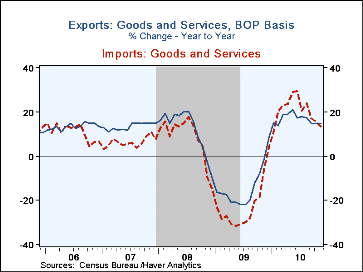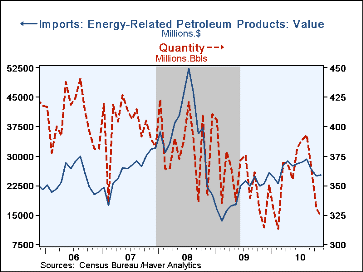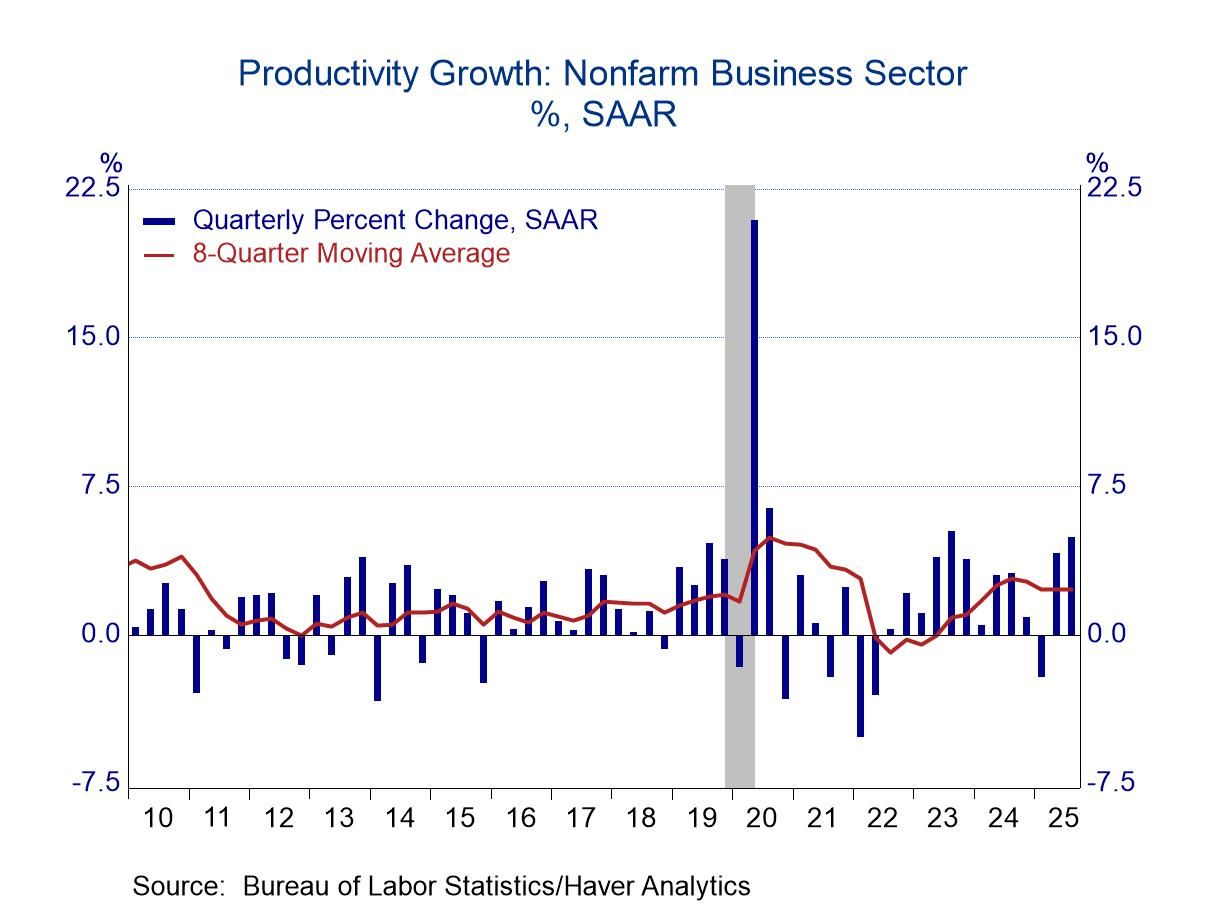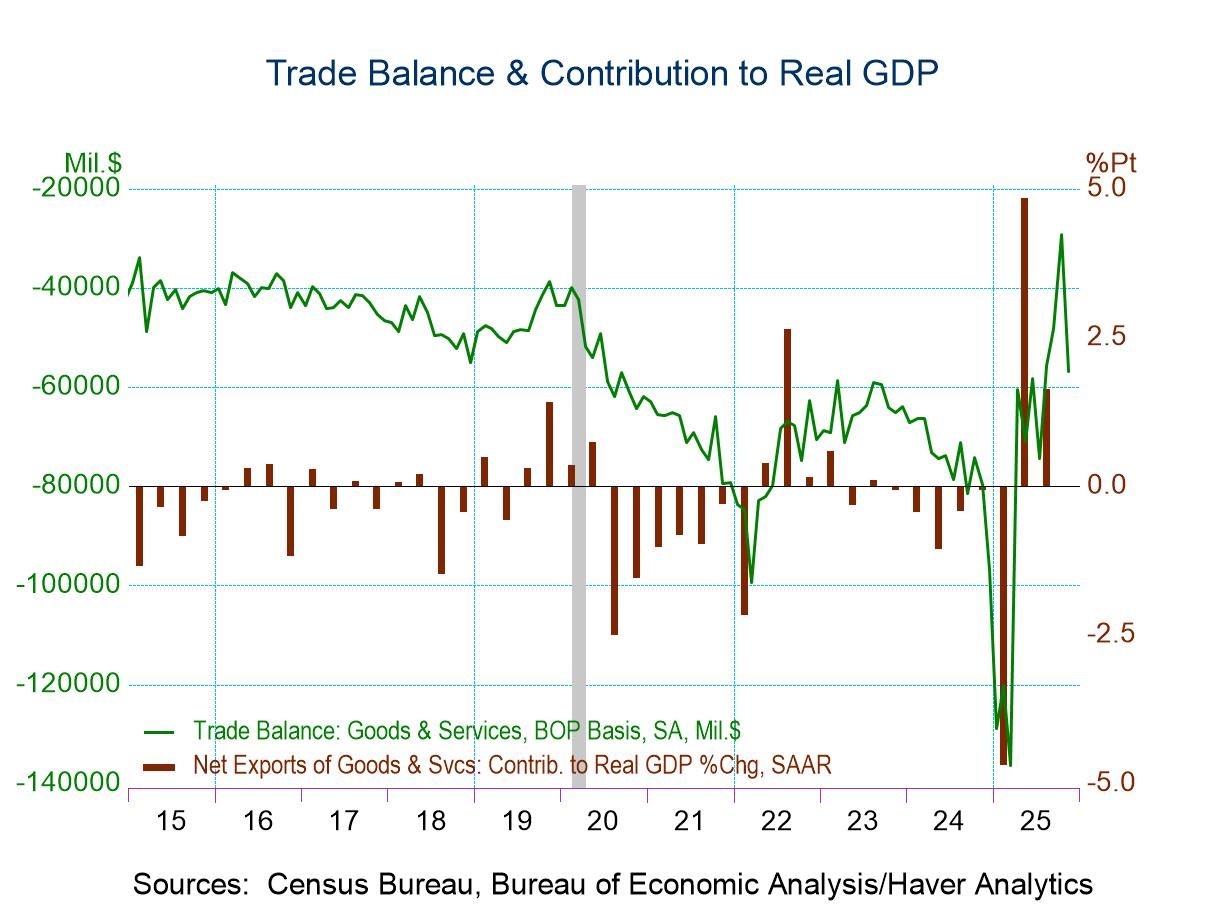 Global| Jan 13 2011
Global| Jan 13 2011U.S. Trade Deficit Stays Roughly Stable In November
by:Tom Moeller
|in:Economy in Brief
Summary
The U.S. foreign trade deficit held roughly stable during November at $38.3B versus $38.4B in October, revised from $38.7B. Consensus forecasts had been for $41.0B. Exports gained 0.8% (14.9% y/y) following their 3.0% October jump [...]
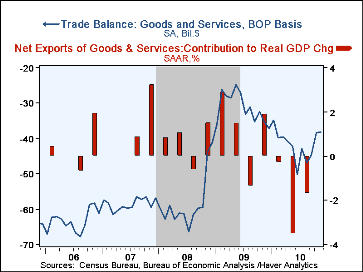 The U.S. foreign trade deficit held roughly stable during November at
$38.3B versus $38.4B in October, revised from $38.7B. Consensus forecasts had
been for $41.0B. Exports gained 0.8% (14.9% y/y) following their 3.0% October
jump while imports rose 0.6% (13.6% y/y) and reversed the October decline. In
chained 2005 dollars, the deficit in goods improved to $45.2B as exports fell
0.6% (+12.2% y/y) and imports slipped 0.1% (+11.6% y/y).
The U.S. foreign trade deficit held roughly stable during November at
$38.3B versus $38.4B in October, revised from $38.7B. Consensus forecasts had
been for $41.0B. Exports gained 0.8% (14.9% y/y) following their 3.0% October
jump while imports rose 0.6% (13.6% y/y) and reversed the October decline. In
chained 2005 dollars, the deficit in goods improved to $45.2B as exports fell
0.6% (+12.2% y/y) and imports slipped 0.1% (+11.6% y/y).
Nominal exports of nonauto consumer goods were strongest posting a 7.0% rise (15.5% y/y) followed by foods, feeds and beverages, up 5.9% (17.3% y/y). Nonauto capital goods inched up 0.5% (14.0% y/y) but automotive vehicle exports fell 5.8% (+9.9% y/y). Other exports fell 11.4% (+26.4% y/y). Nominal imports of goods jumped 2.1% as higher prices lifted oil imports by 6.7% (11.2% y/y). The per barrel cost of imported crude oil was $76.71 versus $74.81 in October. Food, feed & beverages imports also were strong with a 2.1% increase (16.8% y/y). Strength over the last year has been due, however, to higher prices. In constant dollars food imports rose 4.0% y/y. Capital goods imports also were strong. They rose 2.5% (22.6% y/y) and reversed the prior month's decline. Nonauto consumer goods imports fell 2.2% (+9.2%) reversing the prior month's rise.
Services exports slipped 0.2% (+6.7% y/y) led by a 1.6% decline (+10.5% y/y) in travel exports. Passenger fares also fell 3.5% (+26.5% y/y). These declines were offset by a 2.5% increase (5.9% y/y) in the "other" category. Imports of services slipped 0.9% (+5.8% y/y). Travel imports fell 2.3% (+2.5% y/y) and passenger fares fell 1.8% (+8.6% y/y).
The goods deficit with China was roughly stable at $25.6B in November as exports jumped 28.6% y/y and imports were similarly strong, up 27.5% y/y. The trade deficit with Japan also held roughly stable m/m at $5.8B reflecting a 23.3% y/y rise in exports and a 16.2% rise in imports. The trade deficit with the European Union improved slightly to $7.1B as exports grew 12.2% y/y and imports rose 11.0%.
The international trade data can be found in Haver's USECON database. Detailed figures are available in the USINT database.
Expanding Variety of Goods Underscores Battle for Competitive Advantage from the Federal Reserve Bank of Dallas can be found here.
When Tariff Cuts Don't Boost Import Variety also from the Federal Reserve Bank of Dallas is available here.
| Foreign Trade | Nov | Oct | Sept | Y/Y | 2009 | 2008 | 2007 |
|---|---|---|---|---|---|---|---|
| U.S. Trade Deficit | $38.3B | $38.4B | $44.6B | $35.3B(10/09) | $374.9B | $698.8B | $702.1B |
| Exports-Goods & Services (m/m) | 0.8% | 3.0% | 0.5% | 14.9% | -14.6% | 11.5% | 13.5% |
| Imports-Goods & Services | 0.6 | -0.8 | -0.7 | 13.6 | -23.3 | 8.0 | 6.3 |
| Petroleum | 6.7 | -7.4 | -0.4 | 11.2 | -44.0 | 37.0 | 9.4 |
| Nonpetroleum | -0.1 | 0.2 | -1.2 | 16.0 | -20.9 | 1.5 | 4.8 |
Tom Moeller
AuthorMore in Author Profile »Prior to joining Haver Analytics in 2000, Mr. Moeller worked as the Economist at Chancellor Capital Management from 1985 to 1999. There, he developed comprehensive economic forecasts and interpreted economic data for equity and fixed income portfolio managers. Also at Chancellor, Mr. Moeller worked as an equity analyst and was responsible for researching and rating companies in the economically sensitive automobile and housing industries for investment in Chancellor’s equity portfolio. Prior to joining Chancellor, Mr. Moeller was an Economist at Citibank from 1979 to 1984. He also analyzed pricing behavior in the metals industry for the Council on Wage and Price Stability in Washington, D.C. In 1999, Mr. Moeller received the award for most accurate forecast from the Forecasters' Club of New York. From 1990 to 1992 he was President of the New York Association for Business Economists. Mr. Moeller earned an M.B.A. in Finance from Fordham University, where he graduated in 1987. He holds a Bachelor of Arts in Economics from George Washington University.


